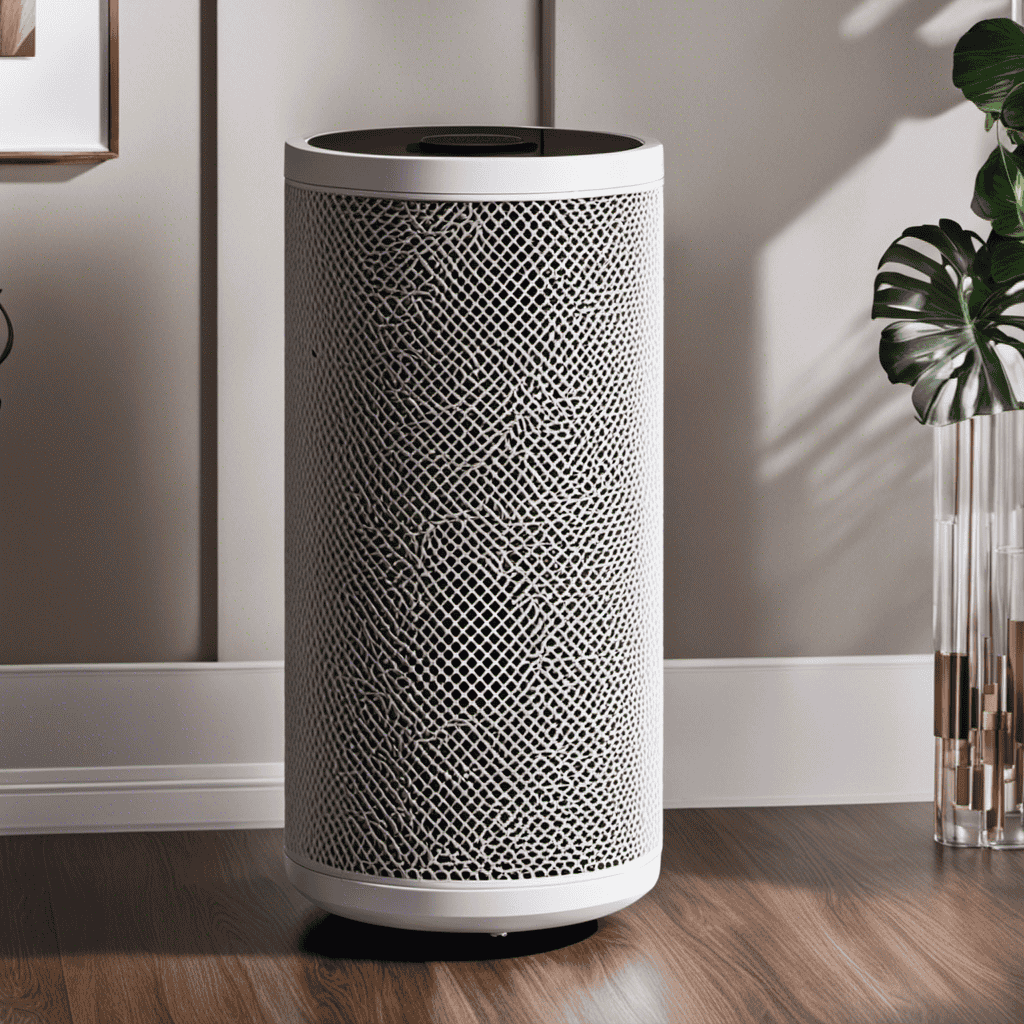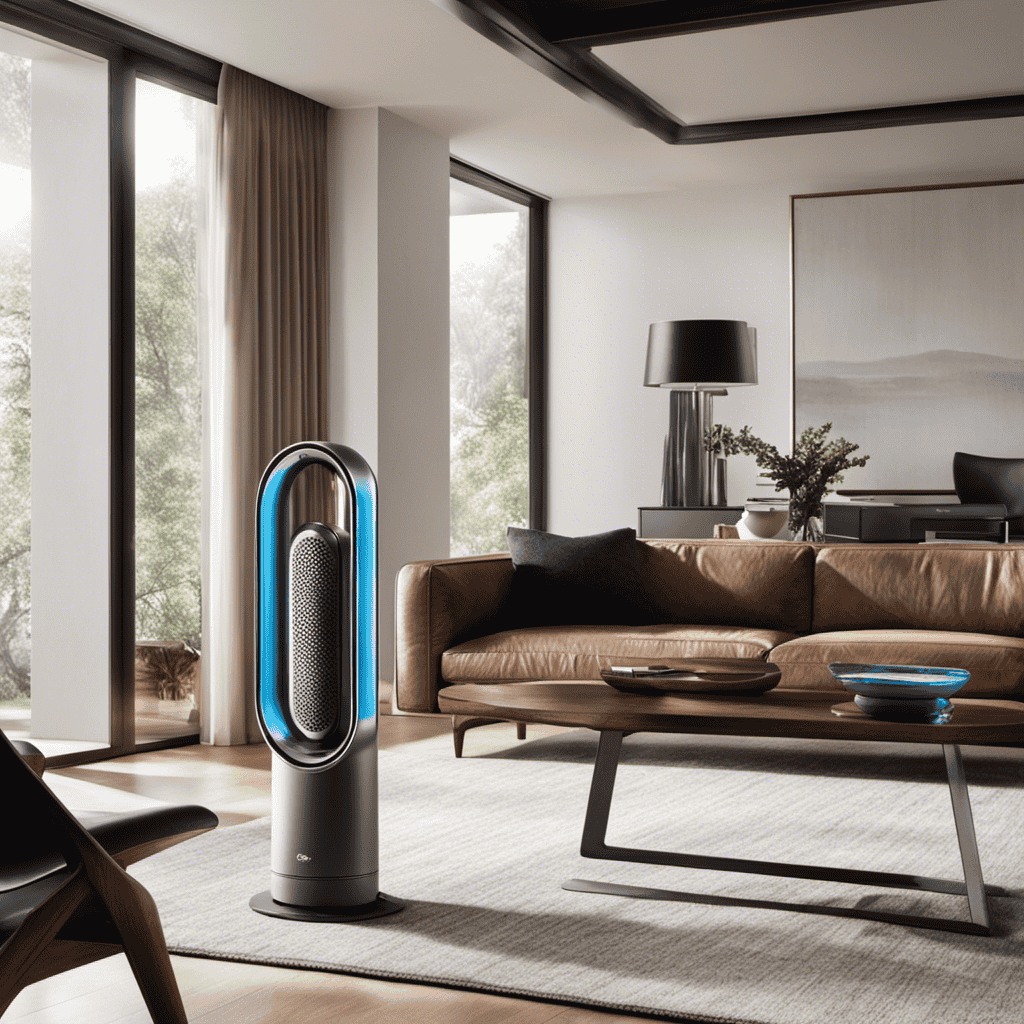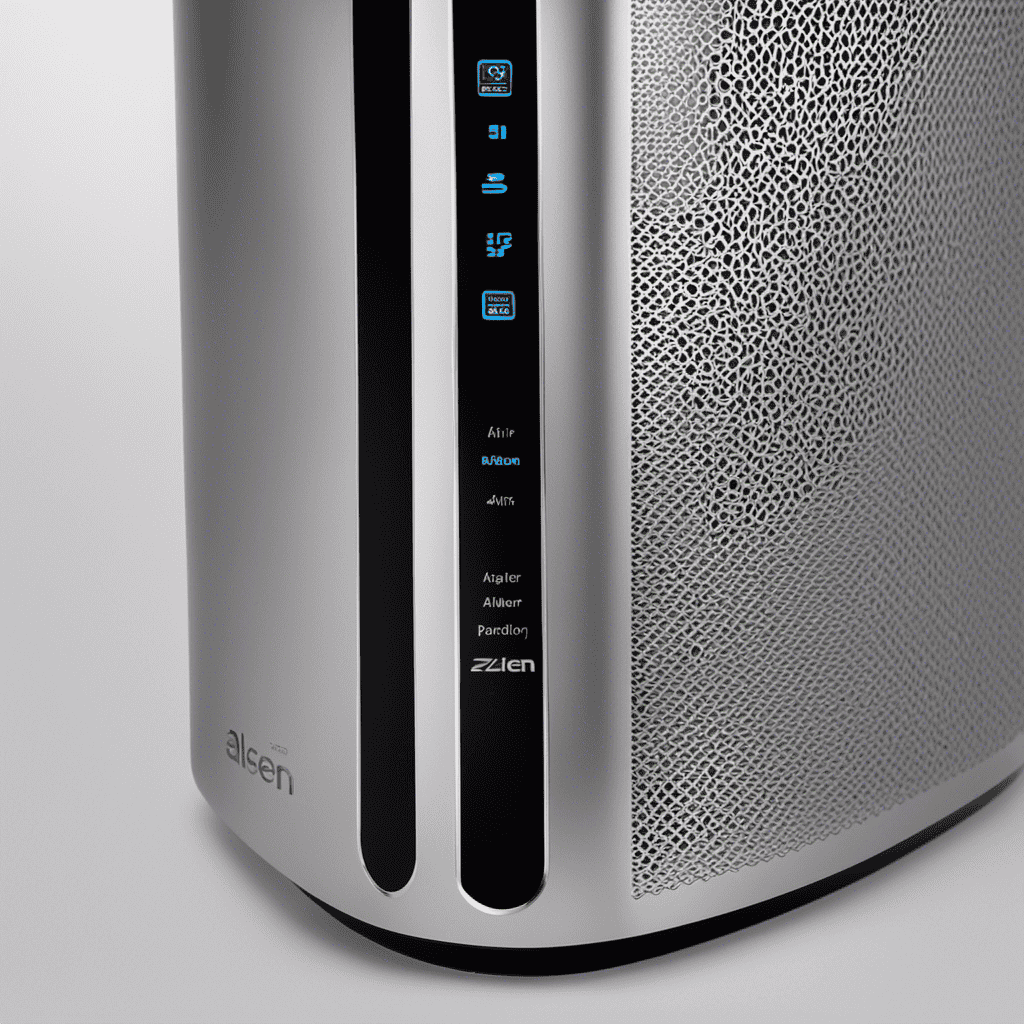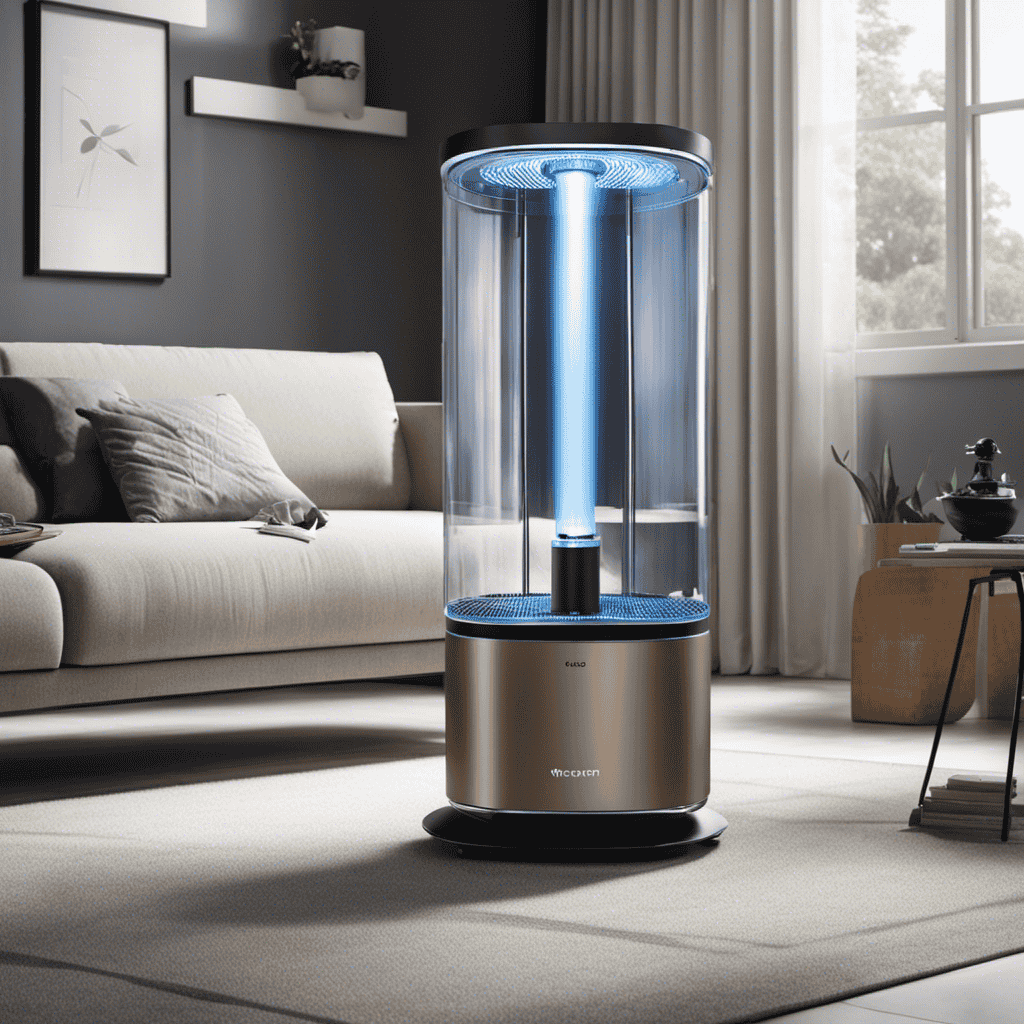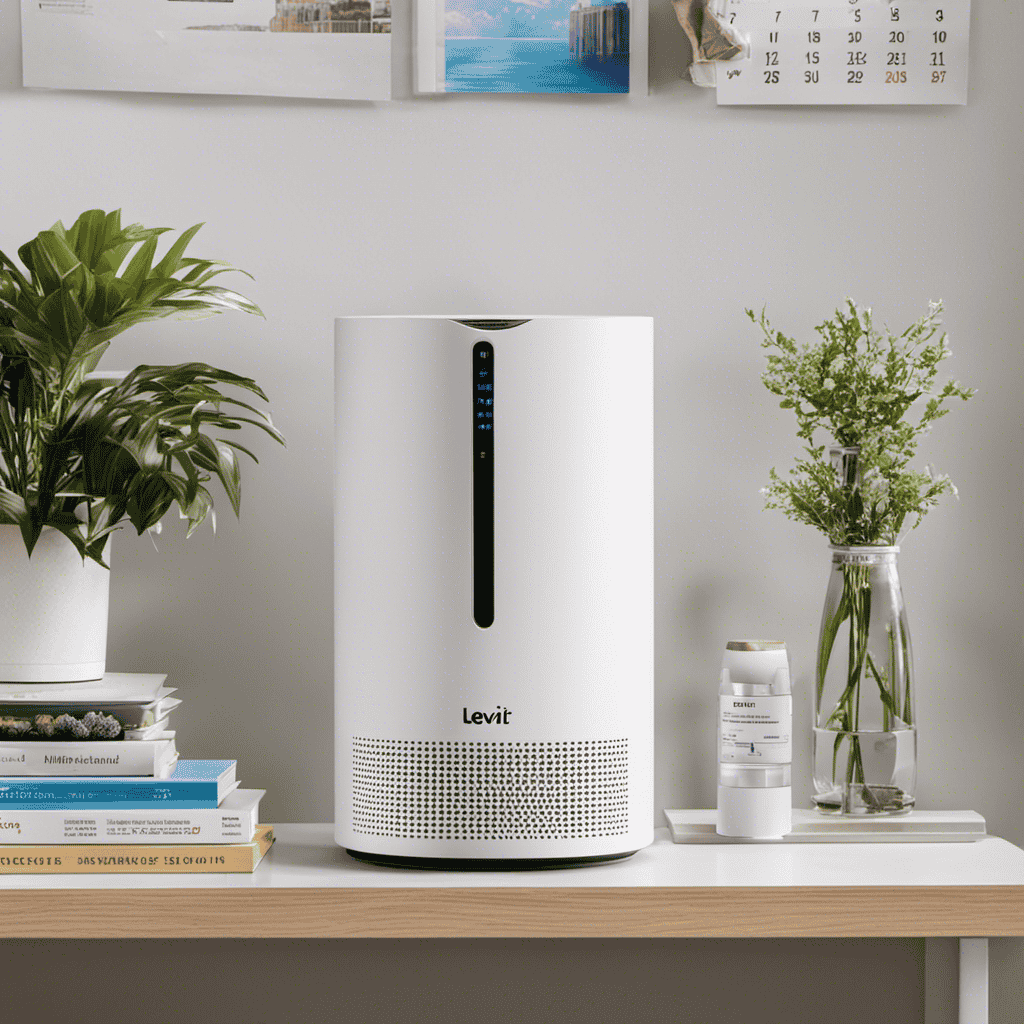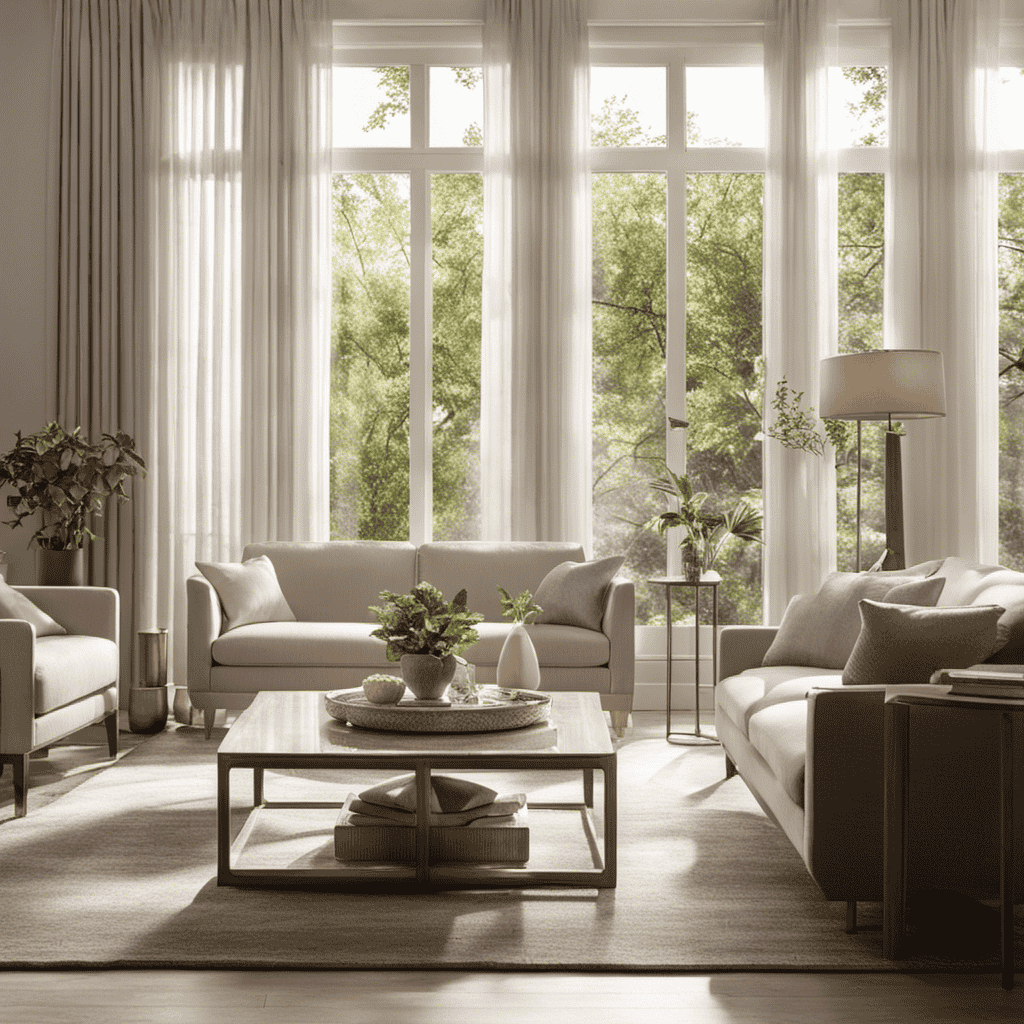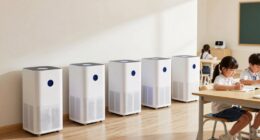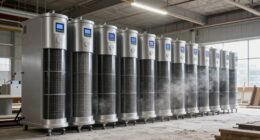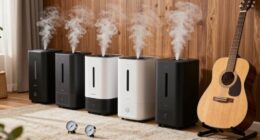A HEPA filter air purifier can rejuvenate your living environment by turning it into a haven of clean, pollutant-free air, much like a breath of fresh air does.
I’ve always been curious about how these devices work and the benefits they offer.
In this article, I’ll delve into the basics of HEPA filter air purifiers, explaining how they function, the key features to look for, and the advantages they provide.
Join me as we explore the world of HEPA filter air purifiers and uncover the secrets to improving your indoor air quality.
Key Takeaways
- HEPA filter air purifiers improve indoor air quality by removing small particles and allergens.
- They are effective in reducing airborne contaminants and can greatly reduce the risk of allergies, asthma attacks, and respiratory issues.
- HEPA filters capture particles as small as 0.3 microns, including dust, pollen, pet dander, and mold spores.
- When choosing a HEPA filter air purifier, consider reputable brands, energy efficiency ratings, additional features, size and coverage area, filter replacement indicator, and noise level.
The Basics of HEPA Filter Air Purifiers
If you want to know the basics of a HEPA filter air purifier, you’re in the right place. HEPA stands for High Efficiency Particulate Air and these filters are designed to improve air circulation by removing small particles and allergens from the air.
They work by trapping particles as small as 0.3 microns, including dust, pollen, pet dander, and mold spores. HEPA filter air purifiers are known for their effectiveness in reducing airborne contaminants, making them a popular choice for those with allergies or respiratory conditions.
In terms of noise levels, most HEPA filter air purifiers operate quietly, allowing you to enjoy clean air without disruption. Additionally, they are energy-efficient and consume minimal power, making them cost-effective in the long run.
How HEPA Filters Work in Air Purifiers
HEPA filters trap tiny particles in the air, helping to improve indoor air quality. These filters are highly efficient and can capture particles as small as 0.3 microns, including pollen, dust mites, pet dander, and mold spores. The advantages of HEPA filters are numerous. They can reduce allergy symptoms by removing allergens from the air, providing relief to those with respiratory conditions. Additionally, HEPA filters can help eliminate odors and smoke particles, making the air fresher and cleaner. However, there are also some disadvantages to consider. HEPA filters can be expensive to replace, and they may require regular maintenance to ensure optimal performance. Additionally, some HEPA filters can produce a noticeable noise level when in use. Overall, the benefits of HEPA filters outweigh the drawbacks, making them a valuable addition to any air purifier.
| Advantages of HEPA Filters | Disadvantages of HEPA Filters |
|---|---|
| Captures tiny particles | Expensive to replace |
| Reduces allergy symptoms | Requires regular maintenance |
| Eliminates odors and smoke | Can produce noticeable noise |
Key Features to Look for in HEPA Filter Air Purifiers
When shopping for an air purifier with a HEPA filter, there are a few key features to consider.
First and foremost, look for reputable air purifier brands known for their quality and reliability. Brands like Dyson, Honeywell, or Blueair have a proven track record in producing effective air purifiers.
Additionally, pay attention to the energy efficiency ratings of the air purifiers you’re considering. Look for models that have received Energy Star certification. These models consume less energy, which can save you money on your electricity bills. Energy efficiency is important not only for environmental reasons but also for your wallet.
Benefits of Using HEPA Filter Air Purifiers
When it comes to improving indoor air quality, one of the key benefits of using HEPA filter air purifiers is their ability to remove allergens and pollutants.
These air purifiers are designed to capture and trap even the smallest particles, such as pollen, dust mites, pet dander, and mold spores, ensuring cleaner and healthier air in your home.
With their high efficiency in removing these irritants, HEPA filter air purifiers can greatly reduce the risk of allergies, asthma attacks, and other respiratory issues.
Improved Indoor Air Quality
Having an air purifier with a HEPA filter can greatly improve indoor air quality. I have personally experienced the benefits of using such a purifier in my home.
Not only does it help to remove dust, pollen, and pet dander from the air, but it also reduces the presence of harmful pollutants and allergens. This has resulted in improved sleep quality for me, as I no longer wake up with a stuffy nose or irritated throat.
The HEPA filter effectively captures and traps airborne particles, preventing them from circulating in the air and causing respiratory symptoms. It has made a noticeable difference in my overall well-being, allowing me to breathe easier and enjoy a cleaner and healthier living environment.
Allergen and Pollutant Removal
You can improve your indoor air quality by using an air purifier with a HEPA filter. These filters are designed to capture allergens and pollutants, making the air cleaner and healthier to breathe. Here are some key benefits of using an air purifier with a HEPA filter:
-
Removes allergens: HEPA filters can effectively capture common allergens such as pollen, pet dander, and dust mites, reducing allergy symptoms.
-
Eliminates pollutants: Air purifiers with HEPA filters can remove harmful pollutants like smoke, odors, and volatile organic compounds (VOCs), improving the overall air quality.
-
Enhances respiratory health: By removing airborne particles, a HEPA filter air purifier can help reduce the risk of respiratory issues like asthma and other respiratory illnesses.
-
Complements indoor plants: While indoor plants can help improve air quality, combining them with an air purifier adds an extra layer of filtration, ensuring cleaner and healthier air.
With advancements in air purifier technology, HEPA filter air purifiers are becoming more efficient at removing allergens and pollutants, making them a valuable addition to any indoor space.
Understanding Air Quality and HEPA Filter Air Purifiers
To better understand air quality and HEPA filter air purifiers, it’s important to know how these devices work and their benefits. HEPA (High-Efficiency Particulate Air) filters are designed to remove particles as small as 0.3 microns from the air, including allergens, dust, pollen, pet dander, and smoke. These filters work by using a dense mat of fibers to trap particles, ensuring cleaner air. By improving air quality, HEPA filter air purifiers can have several benefits for respiratory health. They can reduce symptoms of allergies and asthma, as well as decrease the risk of respiratory infections. Additionally, these devices can be cost-effective in the long term, as they help prevent the need for expensive medical treatments and medications. Overall, investing in a HEPA filter air purifier can greatly improve both air quality and respiratory health.
| Benefits of HEPA Filter Air Purifiers |
|---|
| 1. Removes allergens and pollutants |
| 2. Reduces symptoms of allergies and asthma |
| 3. Decreases risk of respiratory infections |
| 4. Improves overall air quality |
| 5. Long-term cost-effectiveness |
HEPA Filter Air Purifiers Vs. Other Types of Air Purifiers
When it comes to comparing HEPA filter air purifiers with other types of air purifiers, it is important to consider their effectiveness in removing contaminants from the air.
HEPA filter air purifiers are known for their ability to capture and trap particles as small as 0.3 microns, making them highly efficient in removing allergens, dust, and pet dander.
In contrast, ionizers use charged ions to attract and remove particles from the air, but they may not be as effective in capturing smaller particles.
Similarly, UV-C air purifiers use ultraviolet light to kill bacteria and viruses, but they may not be as effective in removing larger particles.
Lastly, ozone generators produce ozone gas to eliminate odors, but they are not recommended for use in occupied spaces due to potential health risks.
HEPA Vs. Ionizers
If you’re deciding between a HEPA filter and an ionizer, it’s important to understand the differences between the two. Here are some key points to consider:
-
Ionizers: These devices release negative ions into the air to attach to and remove airborne particles. They are effective in eliminating odors and neutralizing pollutants. However, ionizers do not actually filter out particles, so they may not be as effective in removing allergens and microorganisms.
-
Activated Carbon: HEPA filters, on the other hand, are designed to physically trap and remove particles from the air. They are highly efficient in capturing allergens, dust, and pollen, making them ideal for individuals with respiratory conditions.
-
Electrostatic Precipitators: These devices use an electric charge to attract and collect particles. While they can be effective in removing larger particles, they may not be as efficient as HEPA filters in capturing smaller particles.
-
HEPA Filters: HEPA filters are considered the gold standard in air purification. They are capable of capturing particles as small as 0.3 microns with an efficiency of 99.97%. This makes them highly effective in removing allergens, bacteria, and viruses from the air.
Overall, when it comes to air purification, HEPA filters provide superior performance and are recommended for individuals with allergies or respiratory issues.
HEPA Vs. UV-C
Now that we’ve discussed the pros and cons of HEPA filters compared to ionizers, let’s move on to another comparison: HEPA filters versus UV-C.
Both HEPA filters and UV-C technology are commonly used in air purifiers to remove airborne pollutants, but they work in different ways.
HEPA filters are highly effective at capturing particles as small as 0.3 microns, including dust, pollen, pet dander, and mold spores. They are also able to trap larger particles, such as allergens and even some bacteria and viruses. However, HEPA filters do not kill these microorganisms, they only trap them.
On the other hand, UV-C technology uses ultraviolet light to kill bacteria, viruses, and mold spores. It is particularly effective against airborne germs. However, UV-C technology is less effective at capturing larger particles like dust and pollen compared to HEPA filters.
HEPA Vs. Ozone
To consider the differences between HEPA filters and ozone, you should be aware that HEPA filters are designed to capture particles, while ozone generators release ozone molecules into the air to neutralize odors and kill bacteria.
When comparing ozone to HEPA filters, it is important to understand the potential dangers of ozone. Ozone can cause respiratory issues and worsen asthma symptoms. It can also react with other chemicals in the air to create harmful byproducts.
On the other hand, HEPA filters are safe and effective in removing particles such as dust, pollen, pet dander, and mold spores from the air. They do not produce any harmful byproducts.
When choosing between ozone and HEPA, it is crucial to prioritize your health and opt for a HEPA filter air purifier.
In the next section, we will discuss how to choose the right size and capacity for your HEPA filter air purifier.
Choosing the Right Size and Capacity for Your HEPA Filter Air Purifier
When selecting a HEPA filter air purifier, make sure you choose the right size and capacity for your needs.
Sizing considerations are important because if you choose a purifier that is too small for your room, it won’t effectively clean the air. On the other hand, if you get one that is too large, you may end up spending more money than necessary.
To determine the right size, consider the square footage of the room you want to purify. Most air purifiers will have a suggested room coverage, which indicates the maximum square footage it can effectively clean. Take this into account when making your decision.
By selecting the right size and capacity, you can ensure that your HEPA filter air purifier will effectively clean the air in your room.
Now, let’s move on to the next section about maintaining and cleaning your HEPA filter air purifier.
Maintaining and Cleaning Your HEPA Filter Air Purifier
Proper filter maintenance is crucial for the optimal performance of your HEPA filter air purifier. Regular cleaning of the filter helps remove trapped particles and maintain the air purifier’s effectiveness.
In terms of cleaning frequency, it’s recommended to clean the filter every three to six months, depending on the air quality and usage of the air purifier.
Proper Filter Maintenance
Regularly cleaning and replacing the filters is essential for maintaining the effectiveness of your HEPA filter air purifier. Here are some important tips to keep in mind when it comes to proper filter maintenance:
-
Filter Replacement: Make sure to follow the manufacturer’s guidelines for filter replacement. Filters should typically be replaced every 6 to 12 months, depending on usage and air quality.
-
Cleaning Schedule: In addition to replacing the filters, regular cleaning is also important. Dust and debris can accumulate on the filters, impacting their efficiency. Cleaning schedules may vary, but a general rule of thumb is to clean the filters every 2 to 3 months.
-
Troubleshooting Tips: If you notice a decrease in the purifier’s performance, it could be due to a clogged or dirty filter. Try cleaning or replacing the filter to see if it improves the air purifier’s effectiveness.
-
Filter Types: Not all air purifiers use the same type of filters. Familiarize yourself with the specific filter type your air purifier uses and ensure you have the correct replacement filters on hand.
Cleaning Frequency Recommendations
To ensure optimal performance, it’s important to clean or replace your filters every 2 to 3 months. Regular maintenance helps to keep your HEPA filter air purifier working effectively and efficiently. Cleaning the filters not only removes trapped particles and allergens, but it also prolongs the lifespan of the filters. There are various cleaning techniques you can use depending on the type of filter you have. For reusable filters, gently vacuuming or rinsing with water can be effective. Disposable filters should be replaced with new ones. When cleaning, it’s important to use recommended cleaning products to avoid damaging the filters. Refer to the table below for some common cleaning techniques and recommended cleaning products:
| Filter Type | Cleaning Technique | Recommended Cleaning Product |
|---|---|---|
| Reusable | Vacuuming | Soft brush attachment |
| Rinsing | Mild detergent | |
| Disposable | Replace | N/A |
Now that we know how to properly clean our filters, let’s address some common misconceptions about HEPA filter air purifiers.
Common Misconceptions About HEPA Filter Air Purifiers
Don’t be fooled by some of the common misconceptions about HEPA filter air purifiers. These devices are often misunderstood, and it’s important to separate fact from fiction.
Here are some common myths about HEPA filters that you should be aware of:
-
HEPA filters remove all types of pollutants: While HEPA filters are highly efficient at capturing particles like dust, pollen, and pet dander, they are not designed to eliminate gases, odors, or volatile organic compounds (VOCs).
-
HEPA filters are noisy: This is not necessarily true. Many modern air purifiers with HEPA filters are designed to operate quietly, allowing you to enjoy clean air without any disturbance.
-
HEPA filters need frequent replacement: HEPA filters are known for their longevity. With proper maintenance and regular cleaning, they can last for several years before needing replacement.
-
HEPA filters eliminate viruses and bacteria: While HEPA filters can capture some airborne viruses and bacteria, they are not guaranteed to eliminate all of them. Additional measures such as proper ventilation and disinfection may be necessary in certain situations.
Understanding these misconceptions will help you make informed decisions when it comes to choosing and using HEPA filter air purifiers.
Tips for Buying the Best HEPA Filter Air Purifier for Your Needs
When considering a HEPA filter air purifier, remember to assess your specific needs and preferences to ensure you find the best option for you.
HEPA filter technology is known for its ability to capture and remove small particles from the air, such as dust, pollen, pet dander, and mold spores. This makes it an excellent choice for individuals with allergies or respiratory conditions.
However, not all HEPA filters are created equal. Look for a purifier that has been certified by the Association of Home Appliance Manufacturers (AHAM) to ensure its effectiveness.
Additionally, consider the energy efficiency of the purifier. Look for models with an Energy Star certification, as they are designed to use less energy and save you money in the long run.
Frequently Asked Questions
Are HEPA Filter Air Purifiers Effective in Removing Viruses and Bacteria From the Air?
Yes, hepa filter air purifiers are effective in removing viruses and bacteria from the air. They also help with allergies and asthma. The hepa filter needs to be replaced regularly. They can also remove odors and smoke. However, there may be potential health risks.
Can a HEPA Filter Air Purifier Help With Allergies and Asthma?
Can a HEPA filter air purifier improve indoor air quality? What are the benefits of using one for allergies and asthma? It filters out allergens and irritants, providing cleaner air and reducing symptoms.
How Often Should I Replace the HEPA Filter in My Air Purifier?
I replace my HEPA filter in my air purifier every 6 months to ensure optimal performance. Regularly cleaning the filter helps remove allergens and pollutants, making the air cleaner and reducing allergy and asthma symptoms.
Can a HEPA Filter Air Purifier Remove Odors and Smoke From the Air?
Sure, a HEPA filter air purifier can effectively remove odors and smoke from the air. It’s one of the many benefits of using a HEPA filter, which is why it’s important to choose the right one for your needs.
Are There Any Potential Health Risks Associated With Using a HEPA Filter Air Purifier?
I’m not sure what the context is for the current question, but I can tell you that there are potential health risks associated with using a hepa filter air purifier.
Conclusion
In conclusion, after learning about the basics, benefits, and key features of HEPA filter air purifiers, I am convinced that they are an essential tool for improving indoor air quality.
The coincidence of discovering the importance of clean air coincides with my recent struggle with allergies. With the ability to capture 99.97% of airborne particles, these purifiers provide a breathe of fresh air.
I am now ready to make an informed decision and invest in the best HEPA filter air purifier for my specific needs.
